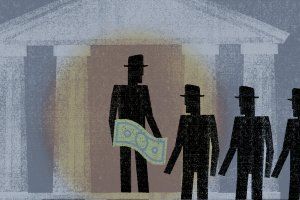
Let's be honest: all the talk about money in politics is tiresome. DNC, RNC, DCCC, RSCC—it's inside stuff. Democrats are spinning their losses by pointing to a last-minute influx of corporate money; Republicans retort that Democrats should stop whining because they spent more money overall, and look where it got them. Everyone's pointing out that the richest candidates (e.g., Meg Whitman) don't always win. Liberals say they're disappointed in President Obama for failing to transform the system. But even the most Feingoldian of them couldn't be bothered to make the biggest systemic issue, campaign finance, into something voters cared about.
So now we're returning to the bad old days when powerful interests could buy politicians without any way to trace it. If the lame-duck Democratic Congress doesn't enact the DISCLOSE Act, which requires outside groups to reveal the names of their biggest donors in TV ads, the 2012 campaign will be about as transparent as a Chinese sovereign-wealth fund.
Almost no one under 60 remembers what fundraising was like before Watergate. Until the 1970s, campaign money was collected by "bagmen," familiar characters from the world of organized crime. As fans of Boardwalk Empire know, a bagman is a political fixer who walked around with stacks of $100 and $1,000 bills. At lower levels, he used brown paper bags. In presidential campaigns, the cash was more likely to be in briefcases. Classier that way.
Today, it's Back to the Bagman. With the Supreme Court's decision in Citizens United, outside groups can pump as much money as they want into campaigns. Republicans always point fingers at unions, but their donations—and those of any large donors to the parties and their authorized committees—are disclosed. It's the corporate and individual giving to outside groups that's undisclosed and, therefore, the functional equivalent of cash. "The U.S. is due for a huge scandal involving big money, bribery and politicians," Al Hunt of Bloomberg News wrote recently.
This year corporations used latter-day bagmen like the Chamber of Commerce, Karl Rove's Crossroads GPS, and other outside groups to secretly spread nearly $300 million in key races. Rove got huffy after Obama warned that foreign money was seeping into American politics, but it's hard to believe it isn't. Saudi sheiks, for example, want to make sure more politicians are elected to protect the oil industry. Why would they or other foreign interests fail to buy influence if it's not illegal and they can't get caught?
Until there is a change in the high court's composition, no law can restrict the amounts raised by independent groups. But Citizens United actually upheld disclosure requirements, which Republicans endorsed for 40 years until it became inconvenient. The House passed the DISCLOSE bill, and it fell a vote short of 60 in the Senate, where Minority Leader Mitch McConnell insisted every Republican (even those who had cosponsored disclosure bills in the past) vote no. John McCain predictably repudiated one of the great principles on which he'd staked his now-tarnished career.
Democrats face a choice. They can shrug and figure they've got bigger things to worry about before the new Congress is sworn in. Or they can stand up for open government, sending a signal that they'll use their power before they lose it. Without reform, a flood of undisclosed money could swamp Obama in 2012 and send even more Democrats into retirement.
Yes, this is an issue for Harry Reid to "go nuclear" on in the lame-duck session. In recent years, the filibuster hasn't been a filibuster at all but a parliamentary understanding when one side falls short of 60 votes. With Obama's backing, Reid can bring Senate business to a halt and educate the country on secret contributions. If Republicans want to flaunt their hypocritical opposition to disclosure, let them do it the old-fashioned way: with cots rolled into the Senate chamber and senators reading from the phone book at 3 a.m. By the third or fourth day of clips on the networks from Mr. Smith Goes to Washington, the public will understand that Jimmy Stewart wouldn't have been on the side of foreign corporations trying to hide their fingerprints.
The great Supreme Court Justice Louis Brandeis once wrote, "Sunshine is the best disinfectant." This idea was at the heart of modern liberalism, from the establishment of the Securities and Exchange Commission to the post-Watergate reforms now under assault. Bagmen operate in the dark, which is where the rest of us will be if we don't bring democracy out of the shadows.
Jonathan Alter is also the author of The Promise: President Obama, Year One and The Defining Moment: FDR's Hundred Days and the Triumph of Hope.
Uncommon Knowledge
Newsweek is committed to challenging conventional wisdom and finding connections in the search for common ground.
Newsweek is committed to challenging conventional wisdom and finding connections in the search for common ground.
About the writer
To read how Newsweek uses AI as a newsroom tool, Click here.





